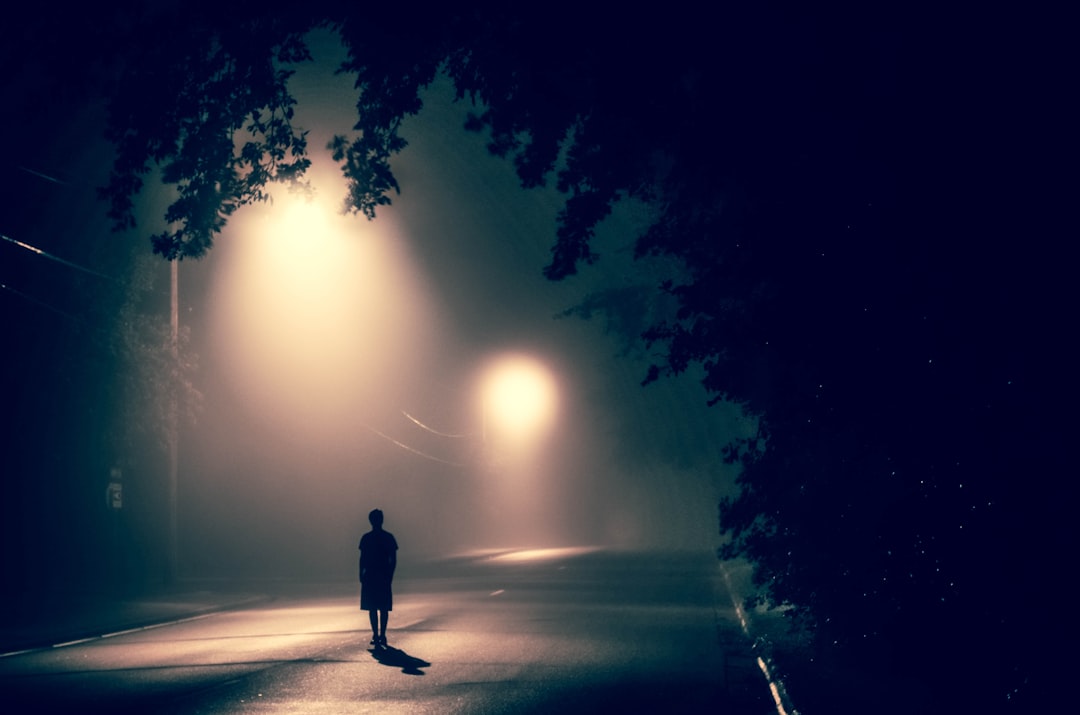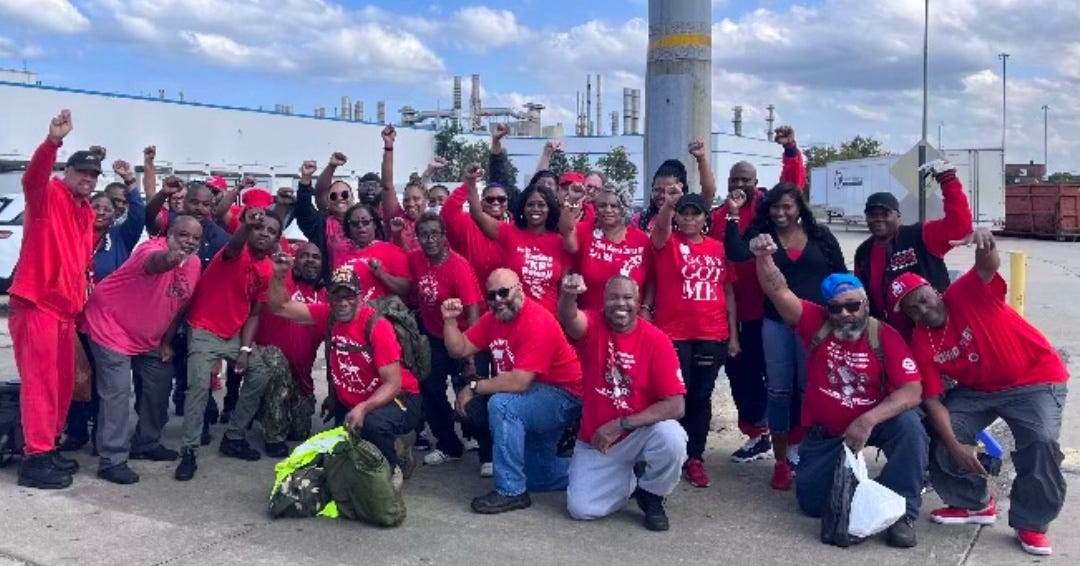You Are Not Alone
Systemic loneliness, picket lines, and talking to your neighbors
About seven years ago I found a room in an East Harlem apartment on Craigslist. It was overpriced, but less overpriced than most. And most importantly it had a deck off the back of my room, where I could sit in my own little oasis. So I wound up relaxing out there for hours, reading or thinking or scrolling my phone. But at night I started to wonder about something. Across from me was a newer building, one of the obvious gentrification semi-modern unattractive new builds. And in its cold windows I would see countless little flickering blue lights, TVs lit up all night, every night. Now I wasn’t exactly surprised that a lot of people watch a lot of TV, but the constancy of the flickering in the windows, especially when I knew the building was filled largely by transplants, got me thinking. I wondered if these people had connections in the neighborhood they lived in. Were they plugged into the community in any way? Were they lonely?
This contemplation wasn’t a conclusion, just a beginning. I was a full-time teacher who would spend Saturdays on the couch, often watching TV, with my roommate who was also working in education. I was less political and less engaged in my neighborhood myself at that time. It would be years before I started doing mutual aid organizing or community organizing. But it started a train of thought that has grown and expanded to this day. The first segment of this line of thinking can be summarized as "so many people are lonely, so many people lack real community, and most of us don’t know what to do about it."

Like all of the biggest problems we face today, people being isolated from one another is not just an individual problem. Systemic isolation is very real, and detrimental. We’re overworked, often with multiple jobs, leaving us with less time for each other. Our cities have become fractured from white flight, the rise of suburbs, urban renewal, and gentrification. The demands of developers and real estate have taken priority over the need that human beings have for community. And small towns have been decimated as well. In some regions, towns based around mining or logging or other forms of extraction were rapidly built up only to be abandoned by the industry decades later. In other areas, it’s the decline of family farming and the rise of agribusiness that has left regions poor and neglected, with working class communities bearing the brunt of the suffering. There is also the issue of people internalizing individualism, selfishness, and owing others nothing, but all of that happens within these particular systemic contexts.
However, there are answers out there too. People are tired of being lonely and tired of a society where we have to confront the problems of poverty and bad governance and violence by ourselves. People everywhere are building community in ways both big and small. A lot of these efforts aren’t flashy and don’t get much attention, but they’re one of the most important trends occurring across the United States at this moment.
I think first of unions. Organized labor is typically thought of as a way to win improvements to wages and conditions, and to hold greedy bosses in check. And it is all that, but it’s also a lot more. Unions can be a potent force in the transformation of society, if they’re pursuing class struggle and building community. I want to emphasize this communal aspect especially because I think a lot of people outside the union movement don’t always see this massive benefit of organizing your workplace.
Maybe no one illustrates this community spirit and energy right now like the auto workers on strike. Their picket lines in 21 states are sites of beautiful solidarity and unity. As they fight for a raise, pensions, and more they’re also strengthening their ties to one another, and to the thousands of people showing up to fight alongside them. In fact, this communal orientation is one of the ways we fight the capitalist class. Although we far outnumber the super-rich, they have top-down power structures and regular communication with each other. They also heavily influence the great majority of our politicians and control the majority of the major media outlets. All this, along with their immense wealth, means that a small number of people often work together effectively to devastating effect in order to stop working class organizing. So we have to meet their coordinated power with coordination of our own. Community and organization are the most powerful ways we can build the power to fight back.
So when workers on the picket line play music, share coffee, or eat snacks and talk into the wee hours of the night with one another, we are building the strength to resist. But that’s just the start. When unions are strong that community exists all year round, not just on the picket line. It flows through union halls, through bonds of solidarity with other unions and organizations, and in a network of people who are there for one another no matter what comes our way. On picket lines right now you’re seeing three generations of union workers, people with unions\ shirts from prior strikes in decades gone by, you’re seeing the long-term networks that are the quiet backbones of strong communities brought into the spotlight. But they’ve been there all along, for decades. Unions can be the sites of powerful relationships, bulwarks against the fracturing of our cities and neighborhoods, and the sort of communal hubs so many of us miss and long for—if we work to build and maintain them.
I know not everyone has instant access to labor organizing, but we can all start by talking to our coworkers, feeling out if they have any issues bothering them at work, and feeling out if they might want to organize. It’ll take time to move towards formally organizing a union at almost any non-union workplace, but we can develop important relationships, build bonds of solidarity by helping one another on the job, and move towards a culture of having one another’s backs and standing up to the bosses even before we officially organize our workplaces.
And, if for any reason, your job is not a viable site for making these connections and building relationships, there’s always going to the picket line of another union. I can’t even count how many people I’ve seen joining members of the UAW, SAG, and WGA in their fights. That doesn’t even factor in the numerous other, smaller strikes popping out around the country as the labor movement surges and workers walk out on strike at higher levels than we’ve seen in several years. One of my favorite examples of how these actions spur even more solidarity and community is that as the Hollywood writers announced that they had won a tentative agreement they simultaneously told everyone to keep hitting the actors’ picket lines, because although the battle was won the war is not yet over. That’s what it’s all about.
If none of the above works for you, or even if it does, there’s also our neighborhoods and blocks and buildings. Whenever you are, you can spark needed conversations about the rent being too damn high, about city services in your area, about how the grocery store keeps getting more expensive. Five years ago, I was a tired high school teacher who didn’t feel like I had time to organize, even though I wanted to. Then, about four years ago, I switched to working multiple part-time jobs, which meant less money but a lot more time. Before I knew it I was getting back into the political world. Suddenly, summer 2020 came along. I was right in the middle of the fray again, and before I knew it I was getting involved in mutual aid organizing. One night, sitting outside Manhattan central booking waiting for some folks arrested at a protest to get out, someone turned to me and suggested a mutual aid night in Washington Square Park to help each other out. So we did. Two and a half years later, Washington Square Park Mutual Aid is still going strong.
While my primary organizing group is no longer the great folks doing mutual aid in the park, my time there was beautiful and transformative, not just because I learned a lot, but because I made connections and built community. Now, my main organizing hub is in my more immediate vicinity, and I can’t describe how good it feels to know my neighbors well and run into people on the street constantly. That might seem like a small pleasure, but to me it’s profound. Because although I used to sit on my back deck and see dozens of little windows flickering by the light of the TV screen, I also was cut off from my community. I would go teach, and there was in many ways a beautiful community at my old school, but then I would come home and not even know the people on my block. There were wonderful people in my life, but I could also walk through my neighborhood without knowing a soul. I’m grateful it’s not that way anymore.
It started with one conversation. One day, back in Washington Square Park, I was talking to someone I had protested with in 2020. They mentioned a group that had just started up in our neighborhood, a group working off the idea that we should prioritize care, not cops. So I went. That was well over a year ago, and just like any group of humans gathered together it hasn’t been perfect, but it’s been wonderful. All of us can make that connection and have this experience. Hit a picket line with a friend. Talk to a coworker. Chat with a neighbor. Look up the groups doing good work near you on Instagram, or on the fliers at a local coffee spot. You are not alone, but finding each other takes work. The rewards of this work will come back to you tenfold, and will also come back to our whole community as we work to transform society so that we’re less cut off from one another and more interconnected. The intentional building and strengthening of community is not only one of the most beautiful things in my life, it’s also right there in the middle of our path to liberation. So I hope to walk that path with you. Solidarity.




Lovely. It’s so easy in this society to get disconnected and we need one another
I also value community and appreciate this focus on it, the lack of it and things to do to create the warmth and validation that comes with a sense of community.